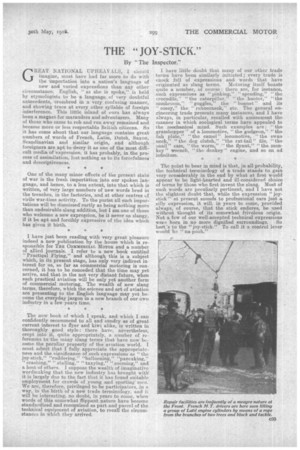THE "JOY-STICK."
Page 13

If you've noticed an error in this article please click here to report it so we can fix it.
By "The
GREAT NATIONAL UPHEAVALS, I should imagine, must have had far more to do with the importation into a nation's language of new and varied expressions than any other circumstance. English, " as she is spoke," is held by etymologists to be a language, of very doubtful antecedents, crossbred in a very confusing manner, and showing trace at every other syllable of foreign interference. This little island of ours has always been a magnet for marauders and adventurers. Many of those who came to .rob and run away remained and became more or less respectable British citizens. So it has come about that our language contains great numbers of words of French, Latin, Dutch, Saxon, Scandinavian and similar origin, and although foreigners are apt to decry it as one of the most difficult media of 'expression, it has probably, in the process of assimilation, lost nothing as to its forcefulness and descriptiveness.
One of the many minor effects of the present state of war is the fresh importation into our spoken language, and hence, to a less extent, into that which is written, of very large numbers of new words bred in the trenches, in the factories, and at other centres ef virile war-time activity. To the purist all such importations will be dismissed curtly as being nothing more than undesirable slang addition, but I am one of those who welcome a new expression, be it never so slangy, if it be apt and forcibly expressive of the idea which has given it birth.
I have just been reading_ with very great pleasure indeed a new publication by the house which is responsible for THE COMMERCIAL MOTOR and a number of allied journals. I refer to a new book entitled " Practieal Flying," and although this is a, subject which, in its present stage, has only very indirect interest for us, so far as commercial motoring is concerned, it has to be conceded that the time may yet arrive, and that in the not very distant future, when such practical aviation will be only yet another form of commercial motoring. The wealth of new slang • terms, therefore, which the science and art of aviation are presenting to the English language may yet become the everyday jargon in a, new branch of our own industry in a few years time.
The new book of which I speak, and which I can confidently recommend to all and sundry as of great current interest to flyer and kiwi alike, is written in thoroughly good style: there have, nevertheless, crept into it, quite appropriately, a number Of references to the many slang terms that have now become the peculiar property of the aviation world. I must admit that I fully appreciate the appropriateness and the significance of such expressions as "the joy-stick," "ruddering," "ballooning," "pancaking," crashing," " stalling," "taxying," "zooming," and a, host of others. I suppose the wealth of imaginative wordmaking that the new industry has brought with it is largely due to the fact that it has found suitable employment for crowds of young and sportingmen. We are, therefore, privileged to be participators, in a way, in the birth of A new trade terminology, and it, will be interesting, no doubt, in years to come, when words of this somewhat flippant nature have become standardized and recognized as part and parcel of the technical equipment of aviation, to recall the circumstances in which they arrived.
Inspector."
have little doubt that many of our other trade terms have been similarly initiated; every trade is cnock full of expressions and words that have originated as slang terms. Motoring itself boasts quite a number, of course : there are, for instance, such expressions as "pinking," "speeding," " the crocodile," " the caterpillar," "the hob-ter," "the mushroom," " goggles, ' the " bonnet " and its " cosey," the " ruboerneck," etc. The general engineering trade presents many instances, and I have always, in particular, recalled with amusement the manner in which zoological terms have appealed to the mechanical mind. Such examples arc: "the grasshopper" of a locomotive, "the gudgeon," "the fish plate," "the camel" locomotive, "the swan _ neck, "the dog clutch," "the rat-tail" file, "the snail" cam, "the worm," " the fiynut," "the monkey" wench, "the donkey" engine, and so on ad infinitum.
The point to bear in mind is that, in all probability, the technical terminology of a trade stands to gainvery considerably in the end by what at first would appear to be light-hearted and ill-considered choice of terms by those who first invent the slang. Moat, of such words are peculiarly pertinent, and I have not the slightest doubt that, while the expression "joystick" at present sounds to professional ears just a silly expression, it will, in years to come, provided always, of course, that the stick endures, be used without thought of its somewhat frivolous origin. Not a few of our well-accepted technical expressions we e, born in no more dignified surroundings. So hers's to the "joy-stick." To call it a control lever would be " na-pooh."






















